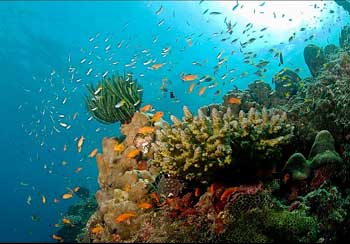Need to ensure conservation and safety of marine ecology at andaman’s
use of extensive sanitisers and plastic during covid lockdown to have long term effect on marine ecology
– Trishla Gupta –
Whilst the lockdown has done wonders for the urban areas and the atmosphere in terms of  restoration of wildlife habitats and even closing of the ozone hole, sadly our precious coral reefs are reeling under even greater challenges. The Great Barrier Reef has just suffered its third Mass Bleaching event in five years last month. The oceans are our natural barriers and take longer to restore themselves than the atmosphere.
restoration of wildlife habitats and even closing of the ozone hole, sadly our precious coral reefs are reeling under even greater challenges. The Great Barrier Reef has just suffered its third Mass Bleaching event in five years last month. The oceans are our natural barriers and take longer to restore themselves than the atmosphere.
COVID 19 is going to put huge undue pressure of lots more plastic trash and chemicals going into the ocean. We, as custodians of the Andaman’s natural habitat, need to be aware and ensure that we work even harder to protect our precious coral reefs that maintain 35% of the Indian Ocean’s biodiversity in species and numbers.
For two odd months, tourism—the engine of economic growth in the Andamans—has been halted. After a series of four lockdowns, the Ministry of Health and Family Welfare (MoHFW) has announced the commencement of unlock one. Hotels and restaurants across the country will soon be buzzing with customers, and with the lifting of interstate travel restrictions and the resumption of commercial aviation, we may even witness a swarm of tourists frolicking around the Andamans.
Over the years, there has been a steady rise in the number of visitors that sojourn the islands. From 3.11 lakh visitors in 2014 to 5.31 lakh in 2018—a 65% increase—tourism in the Andamans, is growing at an exponential rate. The archipelago’s palm-lined, white-sand beaches are home to a variety of animal species, found amidst the depths of its tropical rainforests and the coral reef ecosystem. This natural beauty fuels the tourism industry, thereby turning the wheel of employment and income generation through lifestyle and hospitality chains.
This positive correlation between tourism and economic welfare in the Andamans has led to the construction of over 400 hotels, premium tents, treehouses, beach shacks, and island hopping facilities. “The pristine water with world-class beaches and shallow reefs are a major attraction for tourists. Our aim is to make the Andamans an attractive world-class tourist destination, similar to the Maldives and Mauritius,” a government official told a news agency in November 2019. Since then, several eco-tourism Public-Private Partnerships (PPP) have been initiated to capitalize on the picturesque aesthetics that the islands offer, bringing in investment worth Rs. 650 crore with a precondition of 60% local employment.
Behind the garb of eco-tourism, however, lies the grim reality. The massive construction of hotels and resorts, no matter how ecologically conscious, takes a toll on the natural environment. Over time, “minimal” deforestation of the mangroves paves the way for sedimentary deposits to be let loose into the ocean. As the mangrove grip unbinds, sand particles clog the coral veins (pores), blocking the flow of nutrients that enable the corals to thrive and survive. Now droves of tourists will come with more plastic trash and chemical sanitizers.
What happens when the corals die? The entire marine ecosystem is threatened and eventually dismantled. Corals are dynamic environments where millions of species flourish and proliferate. With corals, the underwater biodiversity also perishes; stripping the islands of its pristine beauty and structural stability as corals absorb around 97% of the wave energy coming from the ocean. This, in turn, damages the aesthetic appeal of the Andamans, burying the tourism industry under the rubble of environmental decay.
But it’s not just the industry that’s hurting the Andamans. Mindless fishing, garbage dumping, reckless diving, and unchecked coral mining are intensifying the problem at hand. It is essential, therefore, that we understand that we are a part of the problem and undertake structural reforms to resolve the conflict between environment conservation and economic development. Does this mean we have to abandon the islands? No. We do, however, need to accelerate education and information dissemination around ecological conservation, becoming more aware of our surroundings and the complex interactions that underpin the natural world. Divers must be encouraged to participate in coral transplantation. Standard Operating Procedures (SOPs) must be enforced for activities such as fishing and mining. Mangroves must be spared and each time anyone itches to toss something into the ocean, their consciousness must appal them for doing so. Some measures that should be taken to ensure the continued conservation and safety of marine ecology in the Andamans include:
Plastic must be totally banned on the Islands, Only non-chemical eco-friendly sanitisers should be used, all boats must ensure no trash is thrown overboard, and we must implement large fines for anyone polluting the ocean.. Only bio-degradable and natural packing must be allowed on beaches. Every hotel must be tasked to ensure that they are responsible for a certain kilometre of coastline.,The ferries must carry beautiful AV content showing the beauty of our coral diversity and educating the tourists so that we appeal to their sensibilities not to trash the ocean.
___________
About the Author
Trishla Gupta
Author & Scuba Diver
Trishla Gupta, Class XII Student of The Shri Ram School, Moulsari in Gurugarm
She is also a certified Scuba Diver and loves and cares for corals.
Disclaimer : The views expressed by the author in this feature are entirely her own and do not necessarily reflect the views of INVC NEWS.


 About the Author
About the Author











